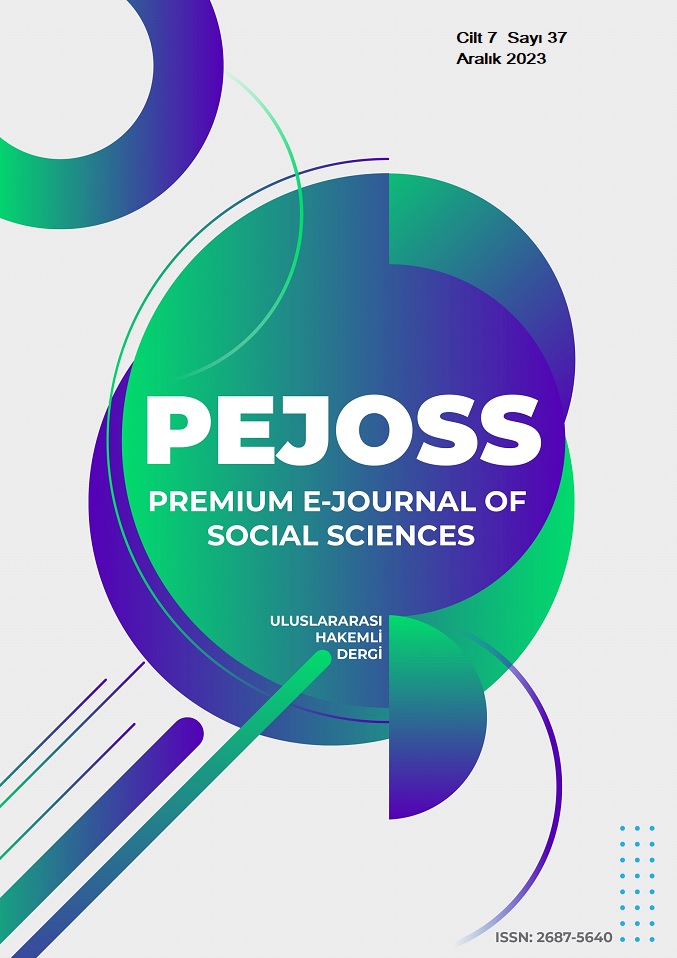Teacher Opinions on the Problems and Management of Distance Education During the Pandemic Process
DOI:
https://doi.org/10.5281/zenodo.10450810Keywords:
Covid-19 Pandemic, Distance Education, Teacher OpinionsAbstract
The aim of this study is to identify the problems classroom and branch teachers working in primary and secondary education during distance education caused by the Covid-19 virus, which started in Wuhan, China and spread to all countries, and to offer solutions to these problems. A total of 30 teachers, 14 of whom are class teachers and 16 of whom are branch teachers, working in Diyarbakır, contributed to the study. In order to collect the data in the study, the interview form titled ‘Problems encountered in distance education during the epidemic and teachers’ views on the management of these problems’ was used. The obtained data were analyzed by descriptive analysis method. As a result of the findings obtained after the application of the interview form; it has been concluded that the students’ attendance to online education is insufficient, the technology to be used to reach the education is insufficient, the internet infrastructure is weak, the teachers have difficulties in the practical lessons, and the parents do not attach importance to the process. Recommendations have been made for the problems encountered in the conclusion and recommendations section of the study.
Downloads
References
Adıyaman, Z. (2002). Uzaktan eğitim yoluyla yabancı dil öğretimi. The Turkish Online journal of Educational Teknology, 1(1), s. 92-97.
Akyürek, M. İ. (2020). Uzaktan eğitim: Bir alan yazın taraması. Medeniyet Eğitim Araştırmaları Dergisi, 4(1), 1-9.
Altunel, M. (2020). 5 Soru: Koronavirüs (covid-19) Salgınının Eğitim ve Öğretmenlere Etkisi. https://www.setav.org/5-soru-koronavirus-covid-19-salgininin-egitim-ve-ogretmenlere-etkisi
Arslan, R. (2021). Salgın Döneminde Uygulanan Uzaktan Eğitime Yönelik Tutum Ölçeği Geliştirilmesi. KAÜİİBFD, 12(23), 369-393.
Aydın, F. (2021). Covid-19 Pandemi Sürecinde Müzik Derslerinin İşlenişine Yönelik Müzik Öğretmenlerinin Görüşleri: Odak Grup Görüşmesi, [Yüksek Lisans Tezi]. Atatürk Üniversitesi Sosyal Bilimler Enstitüsü.
Başaran, M., Doğan, E., Karaoğlu, E., & Şahin, E. (2020). Koronavirüs (Covid-19) Pandemi Sürecinin Getirisi Olan Uzaktan Eğitimin Etkililiği Üzerine Bir Çalışma. Academia Eğitim Araştırmaları Dergisi, 5(2), s. 368-397.
Bozkurt, A. (2017). Türkiye’de uzaktan eğitimin dünü, bugünü ve yarını. Açıköğretim Uygulamaları ve Araştırmaları Dergisi, 3(2), s. 85-124.
Buhrji, M., & Ahmed, D. (2020). Foresight of Coronavırus(COVID-19). Oportunities for a Better Word (March). doi:https://doi.org/10.5923/j.economics.20201002.05
Chen, Q., Liang, M., Li, Y., Guo, J., Fei, D., Wang, L., . . . Zhang, Z. (2020). Mental health care for medical staff in China during the COVID-19 outbreak. Lancet Psychiatry, 7(4), s. 15-16.
Çoruk, A. (2021). Salgın Sürecinde Temel Eğitim. A. Çoruk, & C. Moran içinde, Covid-19 Salgınının Türk Eğitim Sistemine Yansımaları (s. 29-43). Ankara: Pegem Akademi.
Gümüş, B. (2021). Lise Öğrencilerinin Covid-19 Döneminde Stresle Başa Çıkma Düzeyleri Ve Azimleri Arasındaki İlişkinin İncelenmesi, (Yüksek Lisans Tezi). Gaziantep: Hasan Kalyoncu Üniversitesi Lisansüstü Eğitim Enstitüsü.
Huber, S., & Helm, C. (2020). COVID-19 & Schooling: Evaluation, assessment & accountability in times of crises—reacting quickly to explore key issues for policy. practice and research with the school barometer ,Educ Asse Eval Acc. doi:https://doi.org/10.1007/s11092-020-09322-y
Lau, J., Yang, B. & Dasgupta, R. (2020). Will the coronavirus make online education go viral? timeshighereducation.com. https://www.timeshighereducation.com/features/ will-coronavirus-make-online-education-go-viral 20.04.2022 adresinden alındı.
Karadağ, E. & Yücel, C. (2020). Yeni tip korona virüs pandemisi döneminde üniversitelerde uzaktan eğitim: Lisans öğrencileri kapsamında bir değerlendirme çalışması. Yüksek Öğretim Dergisi, 10(2), s. 181-192.
Karatepe, F., Küçükgencay, N., & Peker, B. (2020). Öğretmen adayları senkron uzaktan eğitime nasıl bakıyor? Bir anket çalışması. Uluslararası Sosyal ve Beşeri Bilimler Araştırması Dergisi, 7(53), s. 1262-1274.
Kırık, A. M. (2014). Uzaktan eğitimin tarihsel gelişimi ve Türkiye’deki durumu. Marmara İletişim Dergisi, 21, s. 73-94.
Kırmızıgül, H. (2020). COVID-19 salgını ve beraberinde getirdiği eğitim süreci. Avrasya Sosyal ve Ekonomi Araştırmaları Dergisi (ASEAD), 7(5), s. 283-289
Kocayiğit, A. & Uşun, S. (2020). Milli Eğitim Bakanlığı’na bağlı okullarda görev yapan öğretmenlerin uzaktan eğitime yönelik tutumları (Burdur ili örneği). Avrasya Uluslararası Araştırmalar Dergisi, 8(23), s. 285-299.
Koh, C., G. Lee, L., Lo, C., C., W., & Yap, J. (2020). A Socio-Psychological Perspective. In Challenges and Opportunities in the Post-COVID-19 World . (s. 44-48). Geneva: World Economic Forum. www.weforum.org.
Oyedorun, D. (2020). Sudden change of pedagogy ın education driven by COVID-19: Perspectives and evaluation from a developing country. Research in Globalization, 2, s. 1-5.
Özbay, Ö. (2015). Dünyada ve Türkiye’de uzaktan eğitimin güncel durumu. Uluslararası Eğitim Bilimleri Dergisi, 2(5), s. 376-394.
Patton, M. Q. (2014). Nitel Araştırma ve Değerlendirme Yöntemleri. (M. Bütün, S. Demir, Dü, M. Bütün, & S. Demir, Çev.) Ankara: Anı Yayıncılık.
Samir, S. (2020). www.weforum.org. Technology: Digital Epiphany? COVID-19 and Our Tech Futures. In Insight Report Challenges and Opportunities in the Post-COVID-19 World (s. 24-27). Geneva: World Economic Forum.
Saavedra, J. (2020). Educational challenges and opportunities of the Coronavirus (COVID-19) pandemic. https://blogs.worldbank.org/education/educational-challenges-and-opportunitiescovid-19-pandemi 20.04.2022 adresinden alındı
Toker Gökçe, A. (2008). Küreselleşme sürecinde uzaktan eğitim. D.Ü. Ziya Gökalp Eğitim Fakültesi Dergisi, 11, 1-2.
Winthrop, R. (2020). Top 10 risks and opportunities for education in the face of COVID-19. https://www.brookings.edu/blog/education-plus-development/2020/04/10/top-10risks-andopportunities-for-education-in-the-face-of-covid-19/
Yıldırım, A., & Şimşek, H. (2016). Sosyal Bilimlerde Nitel Araştırma Yöntemleri. (10. bs.). Ankara: Seçkin Yayıncılık.
Yusuf, M. (2011). The impact of self-efficacy, achievement motivation, and self-regulated learning strategies on students’ academic achievement. Procedia - Social and Behavioral Sciences, 15, s. 2623–2626. doi:https://doi.org/10.1016/j.sbspro.2011.04.158
Downloads
Published
How to Cite
Issue
Section
License
Copyright (c) 2023 Premium e-Journal of Social Science (PEJOSS)

This work is licensed under a Creative Commons Attribution 4.0 International License.


